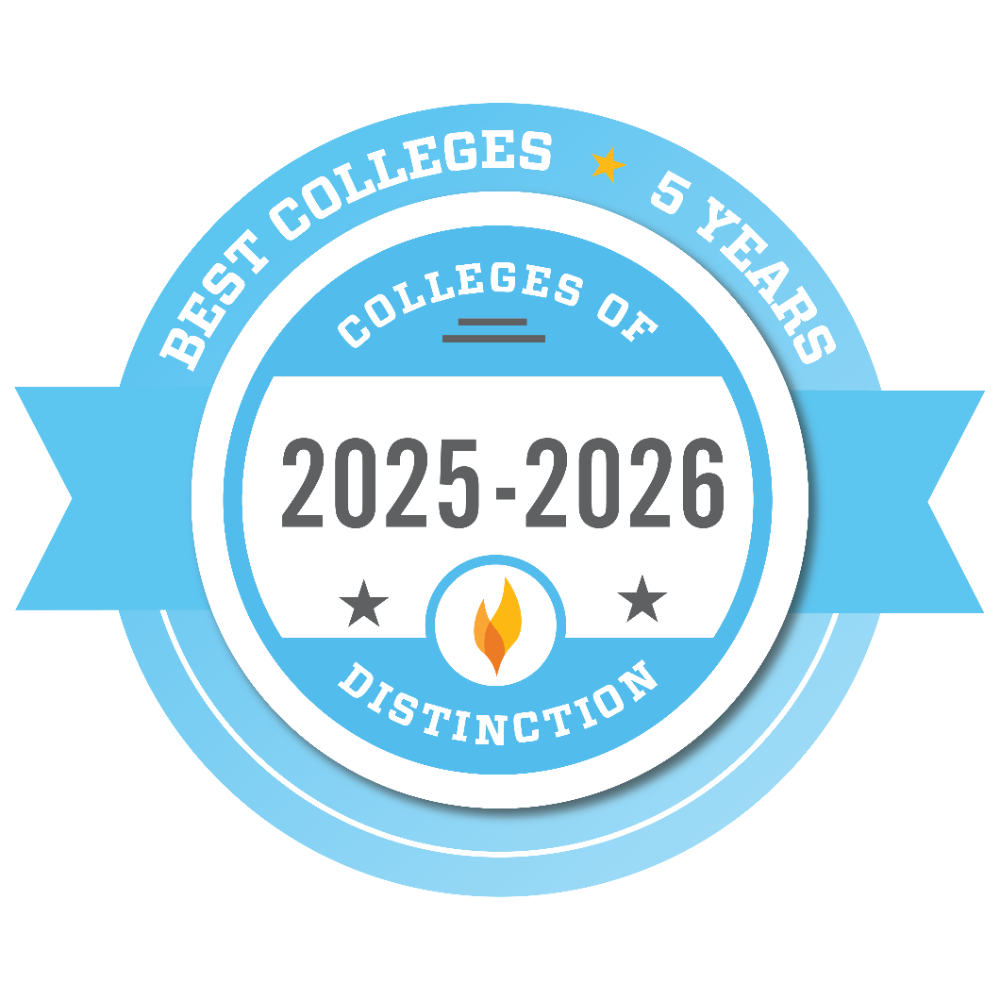Master of Science in Physician Assistant (PA)
-
Degree
Master's
-
School
Health Professions
-
Program Feature(s)
Accelerated Pathways
Program Overview
Physician assistants transform lives through compassionate and effective healthcare. In the Master of Medical Science (MMS) Physician Assistant (PA) program at Franciscan Missionaries of Our Lady University (FranU), you learn to do this and more as you prepare to serve patients across the lifespan and in diverse settings.
Strengthen your critical thinking abilities as you gain clinical expertise in a physician assistant program guided by a clear mission: to develop graduates who provide evidence-based, patient-centered medical care and who are committed to serving all God’s people.
Fast Facts About Physician Assistant at FranU
Accelerated Training Timeline
We help you go farther, faster. In just 28 months of full-time study, you can take the Physician Assistant National Certifying Examination (PANCE) and start your career as a physician assistant.
Accelerated doesn’t mean we sacrifice quality. In 2025, our first-time PANCE takers had a 93% pass rate — above the national average of 91% that same year.
Looking for another pathway toward becoming a PA? Our 3+2 Accelerated Physician Assistant Studies program allows you to earn a bachelor’s degree in biology and human medicine and a master’s in physician assistant studies in only five years, significantly reducing your time to completion.
In-Depth Didactic Learning and Clinical Experiences
At FranU, you learn by doing. We uphold our Franciscan values while providing top-notch medical education through our Simulated Environment Teaching Hospital (SETH). Alternatives to traditional cadavers, like the Anatomage table, enable you to receive valuable hands-on training without putting your values aside.
Anatomy labs are an integral part of the curriculum. There, you work on team-based assignments and develop an interprofessional understanding of healthcare.
In addition to this didactic (classroom) learning, you spend three semesters — 2,000 hours — gaining the clinical experience to exercise sound medical decision-making and provide a broad range of diagnostic and therapeutic services.
Pursue an In-Demand Career in Healthcare
Whatever your career goals, FranU’s program can prepare you for work across a variety of clinical settings and specialties. FranU PA graduates work in primary care, emergency medicine or medical or surgical subspecialties.
We equip you with the skills to meet the field’s 28% increase in demand for qualified professionals — seven times the rate of the national average demand for all occupations. Moreover, as a PA, you can look forward to higher earning potential: in 2024, the median pay in the industry was $130,020.
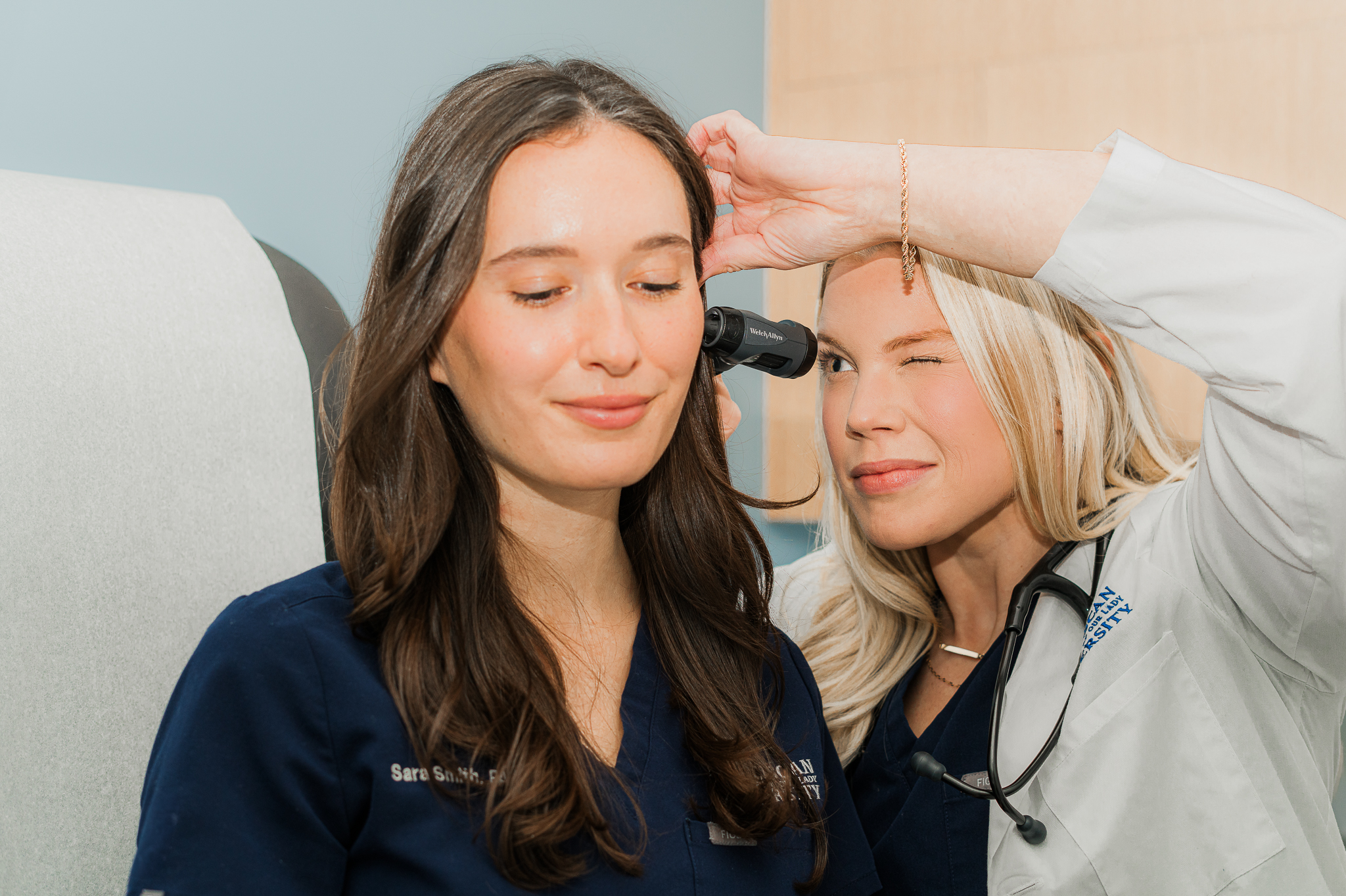
Explore a Career That’s in High Demand
Physician Assistant is ranked #3 on U.S. News’ Best Healthcare Jobs list, recognized for its exceptional salary potential, job stability and meaningful patient care. FranU graduates are equipped to serve as compassionate, skilled healthcare professionals in hospitals, clinics and other clinical settings.
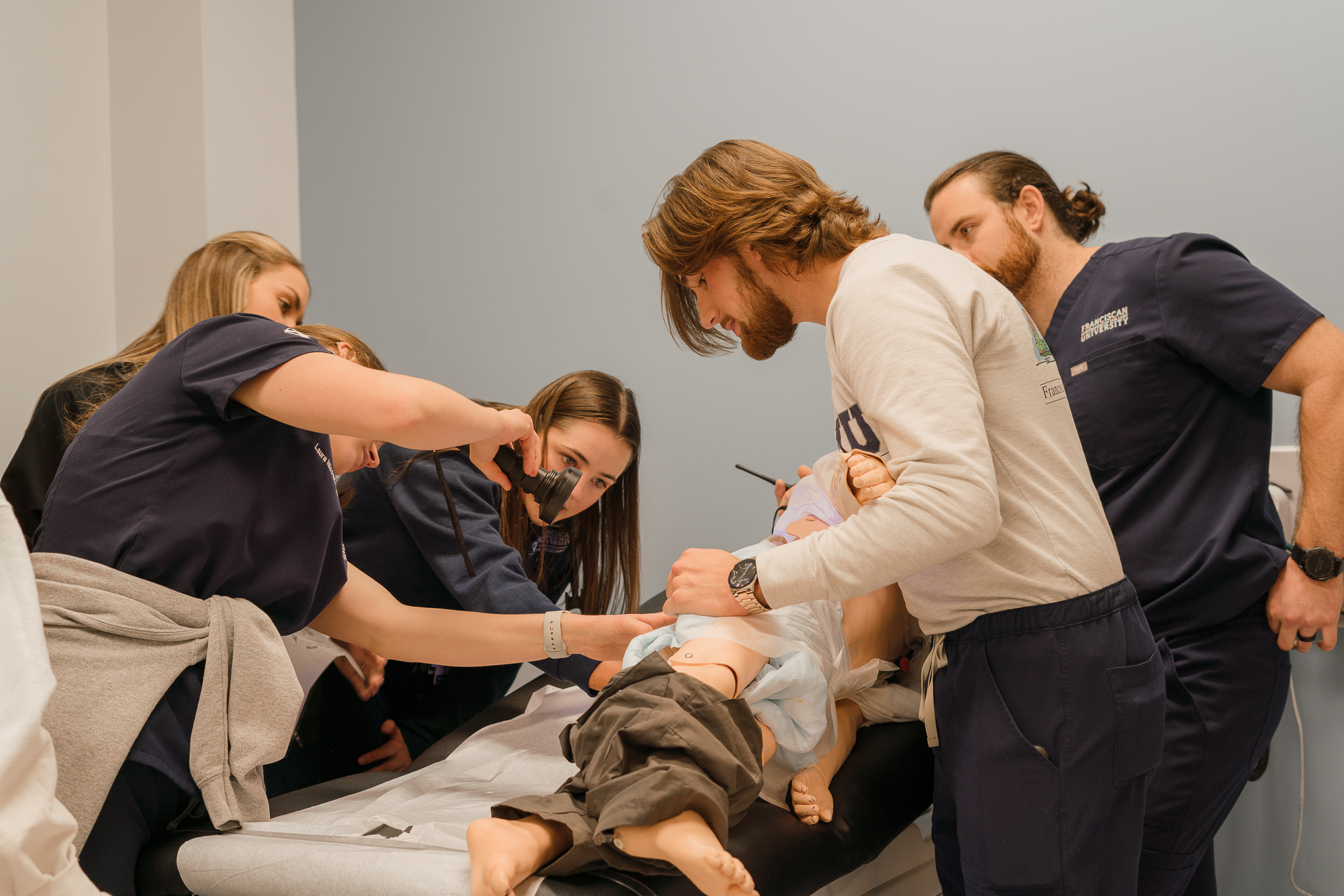
Accreditation Update
The Physician Assistant Studies program at FranU has regained full accreditation from ARC-PA, valid through 2033. Learn more on our Institutional Accreditation page.
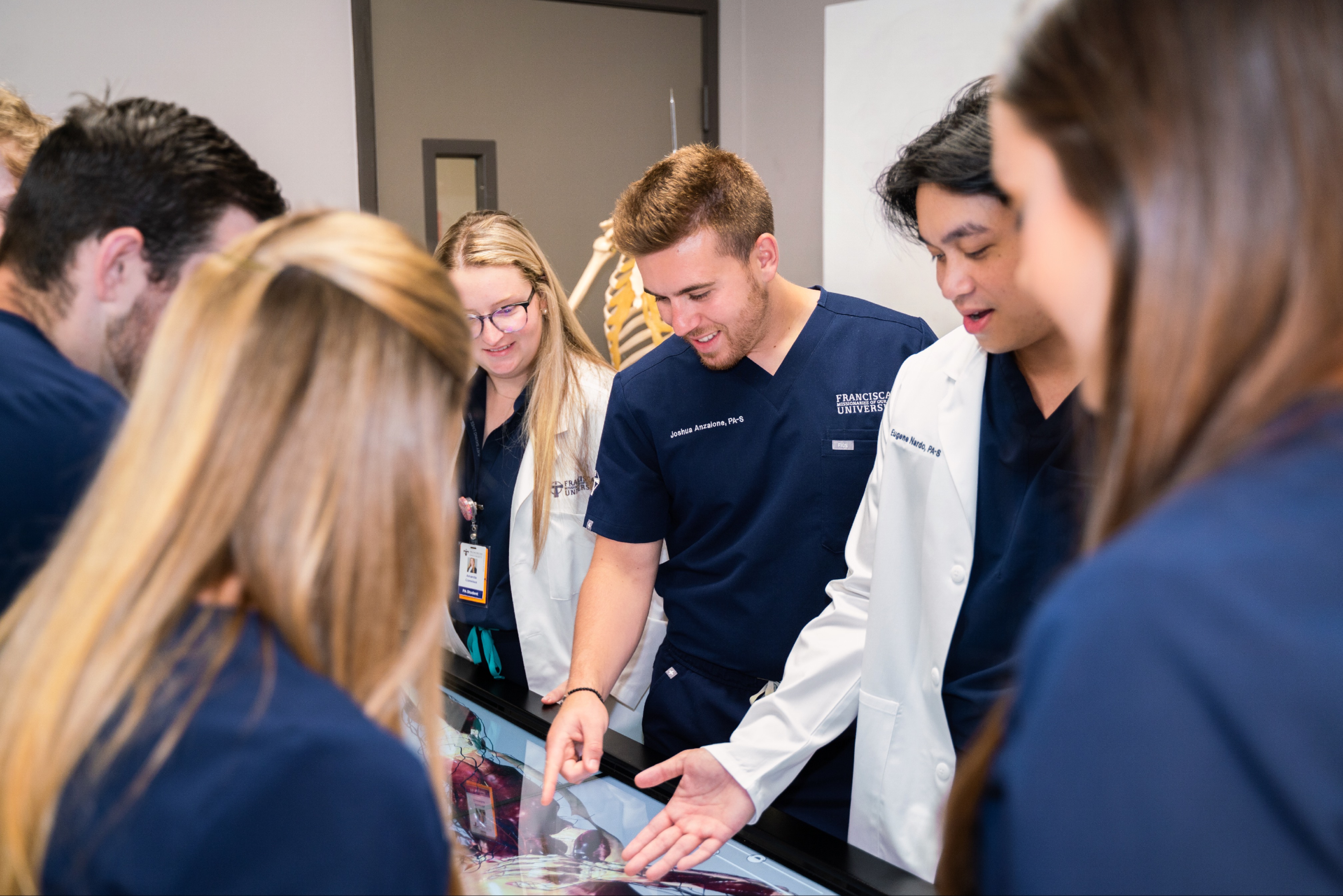
Meet the Experts Behind FranU’s PA Program
The physician assistant program at FranU is led by a team of experienced faculty who bring a dynamic mix of clinical expertise, academic excellence and real-world healthcare knowledge to the classroom. With backgrounds spanning multiple specialties, they’re dedicated to preparing future PAs to deliver compassionate, patient-centered care in diverse clinical environments.
PA Program Overview & Outcomes
Program Mission and Goals
Guided by the tradition of compassionate healthcare exemplified by the Franciscan Missionaries of Our Lady, the physician assistant program's mission is to develop graduates who will provide evidence-based, patient-centered medical care and who are committed to serving all God’s people.
Our program goals are as follows:
-
The first-time pass rate for the Physician Assistant National Certifying Exam (PANCE) will be at or above the national average
-
100% of the program's graduates will be employed within one year of graduation
-
Students and Faculty will participate in at least 250 community service hours per academic year
Learning Outcomes
The program has identified seven program learning outcomes (PLO) as well as 45 associated entry-level PA competency measures (COMP). The learning outcomes and competencies were developed based on standards published by the National Commission on the Certification of Physician Assistants, the American Academy of Physician Assistants and the Physician Assistant Education Association.
As such, upon completion of the program, the entry-level PA graduate will successfully demonstrate the knowledge, skills and professional attributes defined by the program learning outcomes (PLO) and associated competencies (COMP).
Student Graduation Rate
Attrition rate refers to the number of students who leave a program before completing all of the requirements to earn their degree. We calculate the attrition rate by dividing the number of students exiting the program by the total number of students in the incoming class. Learn more about PA student graduation rates.

What Can You Do With a Physician Assistant Master’s Degree?
A physician assistant master's degree equips you with a versatile skill set that opens doors to a wide range of professional opportunities in primary care, community clinics and hospitals. While the main role for most PAs is in clinical practice, your career options extend beyond direct patient care.
You can pursue positions in education, research, healthcare administration or public health. You may also leverage your medical knowledge in the pharmaceutical or medical device industries. With experience, you can specialize in a particular area of medicine, take on leadership functions or even start your own clinic in some states.
PA Program Admissions Information
Apply to FranU’s Master of Medical Science in Physician Assistant Studies program through the CASPA portal by September 1st.
Admissions Requirements
Admissions requirements* for the PA program at FranU include:
-
A baccalaureate degree from a regionally accredited U.S. college or university or equivalent.
-
Meet the following GPA minimums:
-
Cumulative Undergraduate: 3.0
-
FranU Prerequisites: 3.0
-
Cumulative Undergraduate Science: 3.0
-
-
Completed all prerequisite courses within seven years of application.
-
Applicants must meet and maintain all Technical Standards to enroll in and progress through the PA program.
Application Materials
-
Submit three letters of recommendation.
-
Submit a personal statement summarizing why you desire to be a Physician Assistant and what you feel you can contribute to the profession and the mission of Franciscan Missionaries of Our Lady University’s PA program.
- Completed the Casper assessment by the due date (posted annually in theCASPA portal).
-
The Casper assessment helps us evaluate the behavioral attributes necessary to succeed as a PA student. Applicants are responsible for scheduling their Casper test from available test dates (which vary by application cycle) and for the testing fee.
-
Failure to complete the Casper assessment before the published deadline will result in ineligibility for an interview. Explore instructions and tips for taking the Casper assessment.
-
-
Attend a personal interview.
*The Accreditation Review Commission on Education for the Physician Assistant, Inc. (ARC-PA) has granted Accreditation-Continued status to the Franciscan Missionaries of Our Lady University Physician Assistant Program sponsored by Franciscan Missionaries of Our Lady University.
Accreditation-Continued is an accreditation status granted when a currently accredited program is in compliance with the ARC-PA Standards.
Accreditation remains in effect until the program closes or withdraws from the accreditation process or until accreditation is withdrawn for failure to comply with the Standards. The approximate date for the next validation review of the program by the ARC-PA will be October 2033. The review date is contingent upon continued compliance with the Accreditation Standards and ARC-PA policy.
The program’s accreditation history can be viewed on the ARC-PA website at:
https://www.arc-pa.org/wp-content/uploads/2025/10/Accreditation-History-Franciscan-Missionaries-of-Our-Lady-107.pdf
Prerequisite courses* for the MMS - Physician Assistant program include:
-
Human Anatomy with lab
-
Human Physiology (combined anatomy and physiology I and II with labs are acceptable alternatives)
-
General Microbiology
-
Organic Chemistry I
-
Organic Chemistry II (2000 level or higher) or Biochemistry (3000 level or higher)
-
General Psychology
-
Statistics
-
Genetics
-
Medical Terminology (certificate or other courses acceptable)
*Please note:
-
Applicants must make a minimum of C or higher in all prerequisite coursework.
-
"Survey" courses do not meet admissions criteria.
-
B or higher in all prerequisite coursework is preferred.
-
Repeated coursework negatively impacts the applicant.
-
No graduate, medical school or other transfer credit will be awarded as advanced placement/PA program credit.
- While the program will not waive any prerequisite requirements, in some circumstances,
the PA admissions committee may allow substitutions for equivalent or more rigorous
previous graduate, medical school course work or professional experience(s) as satisfying
prerequisite requirements ONLY. This may apply to prerequisite courses taken beyond
seven years ago as well.
-
Applicants requesting such substitutions should email pa@franu.edu to request a copy of the prerequisite substitution form. The form must be completed by the applicant and submitted to the admissions committee for consideration. Applicants should include detailed descriptions of course work, professional experiences, a copy of the undergraduate transcript and any additional materials as requested by the committee. The committee will evaluate each request on a case-by-case basis and all decisions made will be final.
-
-
Example: A currently practicing licensed clinical social worker applies to the program. The applicant holds an undergraduate degree in psychology (2008) and a master's of social work (2011). She has conducted clinical research with several peer-reviewed publications. In this circumstance, the admissions committee will accept her Psychology 101 course taken in 2005 and her master's level Biostatistics course (taken in 2010) as satisfying the prerequisites because she has demonstrated evidence of continued knowledge and skills in those particular areas, despite the age of the courses.
When soliciting your letters of recommendation, keep the following in mind:
-
Letters should be from individuals who know you well; former professors, employers and healthcare/professional colleagues are good choices.
-
Recommenders should consider and attest to your academic success, work ethic, maturity, professionalism, interest in the healthcare field, etc.
-
Letters must be submitted directly from the recommender through the CASPA portal (not mailed or emailed to program faculty or University administration).
-
While it may be tempting to ask "high-profile" community members to provide a letter of recommendation, these are not generally helpful unless the above criteria are met; no extra consideration is provided for such letters.
Physician assistants must have the knowledge, skills and attitudes necessary to render a wide spectrum of patient care services in a broad variety of clinical situations. Consequently, it is essential that in its admission process, the physician assistant program assesses an applicant’s physical and emotional capabilities as well as his/her scholastic accomplishments and academic potential in order to assure that the applicant can meet the full demands of the program’s curriculum and graduate as a skilled and effective healthcare provider.
In making this assessment, the program must consider the applicant’s current physical and emotional status, any cumulative or progressive disability and any drug-induced impairment that may pose obstacles to the safe application of his/her knowledge and skills to the provision of quality care or prevent effective interaction with patients. Learn more about Technical Standards.
After the initial application review, qualified applicants will be further screened via personal interviews.
The PA program strives to transform enrolled students into competent entry level PAs as well as mission-centered servant leaders. As such, other factors such as diversity, maturity, professionalism, compassion and service to community are also important criteria for acceptance.
Therefore, in addition to excellence in academics, the admissions committee weighs other individual factors when considering each applicant, including:
- Applicants from the University’s 3+2 Accelerated Pathway to Physician Assistant Studies; 3+2 students must meet all minimum admissions requirements as outlined above
- Hands-on patient care experience
- Licensed healthcare worker
- Shadowing one or more PAs
- Military service
- Work/professional experience
- Franciscan Missionaries of Our Lady University graduate
- Applicants from medically underserved areas
- Mission work/community service
- Graduates from Catholic universities
In general, the higher the GPA and greater number of additional admissions considerations, the more competitive the applicant.
The following table should give the applicant guidance as to how competitive he/she is in comparison to prior PA classes. The competitive candidate has a “B” or better in all defined pre-requisite course work. Repeated attempts at pre-requisite coursework will be noted and weaken candidate’s overall application packet.
| Cohort | Cumulative Undergrad GPA | Prerequisite GPA | Science GPA | Volunteer Hours | PA Shadowing Hours | Direct Patient Care Hours | Work Experience Hours |
|---|---|---|---|---|---|---|---|
|
2022 |
3.4 |
3.4 |
3.3 |
256 |
131 |
2427 |
1714 |
|
2023 |
3.6 |
3.6 |
3.5 |
217 |
93 |
2153 |
2876 |
|
2024 |
3.6 |
3.6 |
3.5 |
304 |
218 |
2020 |
969 |
|
2025 |
3.7 |
3.7 |
3.6 |
284 |
115 |
1537 |
629 |
|
2026* |
- |
- |
- |
- |
- |
- |
- |
|
2027 |
3.6 |
3.58 |
3.47 |
152 |
95 |
1452 |
957 |
|
3 Year Mean |
3.6 |
3.6 |
3.5 |
247 |
143 |
1670 |
852 |
*We did not admit a 2026 cohort
A graduate degree is an investment in your future. We understand that to make informed decisions about funding your degree, you need transparent information about the cost of your education. That’s why we provide you with a comprehensive breakdown of our tuition rates and fees.
This program includes fees beyond standard tuition. For a detailed breakdown, please review the official document
When it comes to financial aid, Franciscan Missionaries of Our Lady University has counselors available to assist you at every step of the process. We encourage you to complete the Free Application for Federal Student Aid (FAFSA) form to see if you qualify for federal financial aid.
As an enrolled student, you may also be eligible for a number of scholarship awards offered by professional PA organizations. In addition, you may qualify for FranU’s Franciscan Missionaries of Our Lady Sisters Graduate Scholarship, which is awarded each year.

Become a Physician Assistant by Earning a Master’s Degree at FranU
FranU’s PA program offers a top-notch combination of clinical and classroom experience in just 28 months of rigorous study. You graduate prepared to transform lives through quality patient care rooted in the values that drive your purpose.
Take the next step — apply to the PA program today!
Resources for Current PA Students
Already enrolled and looking for information about clinical rotations, student organizations or the student handbook? We’ve got you covered.
FranU ARC-PA Accreditation
The Accreditation Review Commission on Education for the Physician Assistant, Inc. (ARC-PA) has granted Accreditation-Continued status to the Franciscan Missionaries of Our Lady University Physician Assistant Program sponsored by Franciscan Missionaries of Our Lady University.
Accreditation-Continued is an accreditation status granted when a currently accredited program is in compliance with the ARC-PA Standards.
Accreditation remains in effect until the program closes or withdraws from the accreditation process or until accreditation is withdrawn for failure to comply with the Standards. The approximate date for the next validation review of the program by the ARC-PA will be October 2033. The review date is contingent upon continued compliance with the Accreditation Standards and ARC-PA policy.
The program’s accreditation history can be viewed on the ARC-PA website at:
https://www.arc-pa.org/wp-content/uploads/2025/10/Accreditation-History-Franciscan-Missionaries-of-Our-Lady-107.pdf
FranU Regional Accreditation
For information about our SACSCOC accreditation, please visit our Institutional Accreditation page.
Frequently Asked Questions
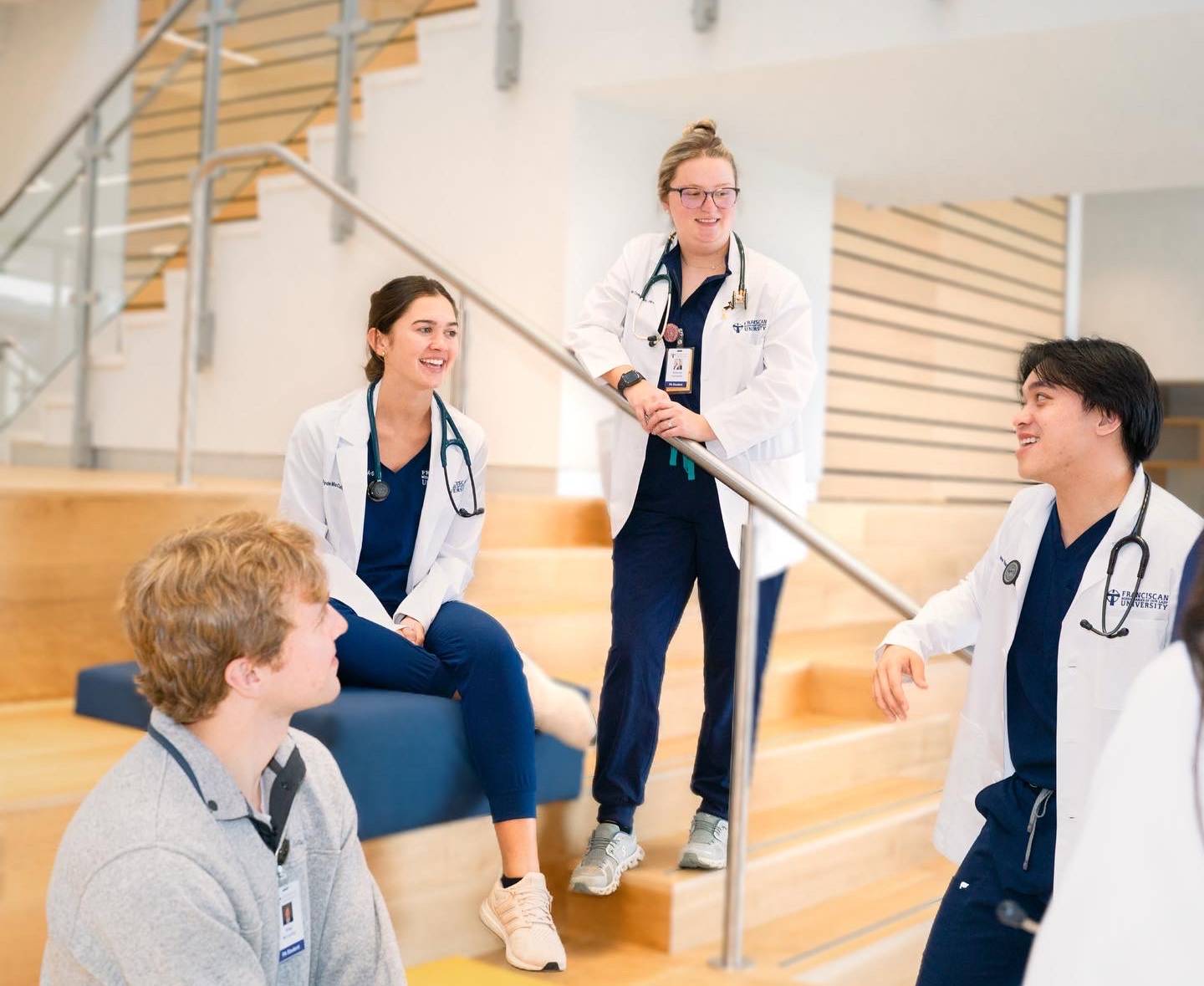
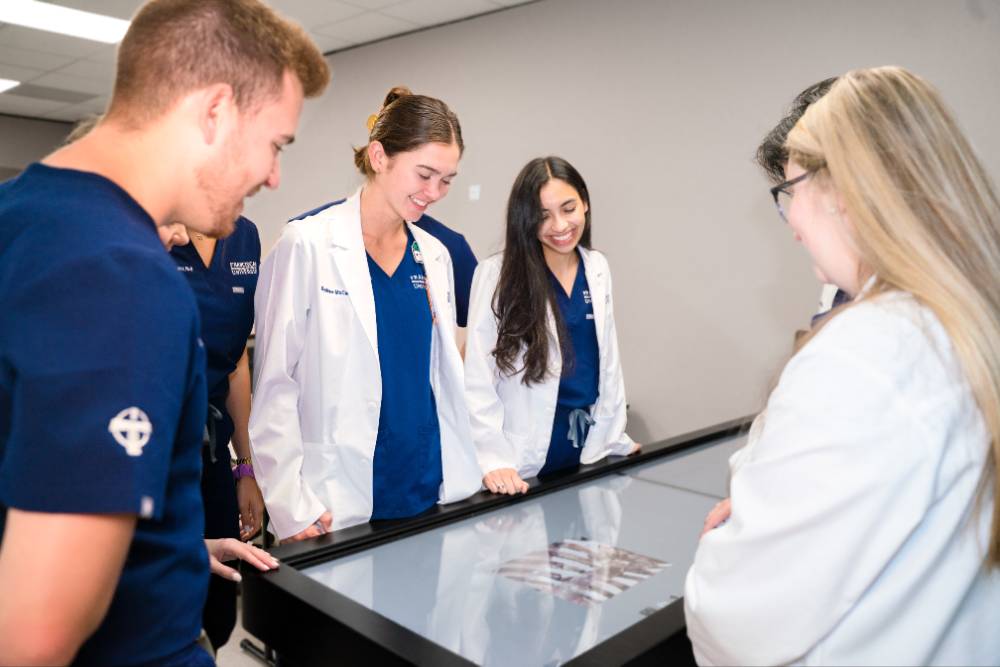
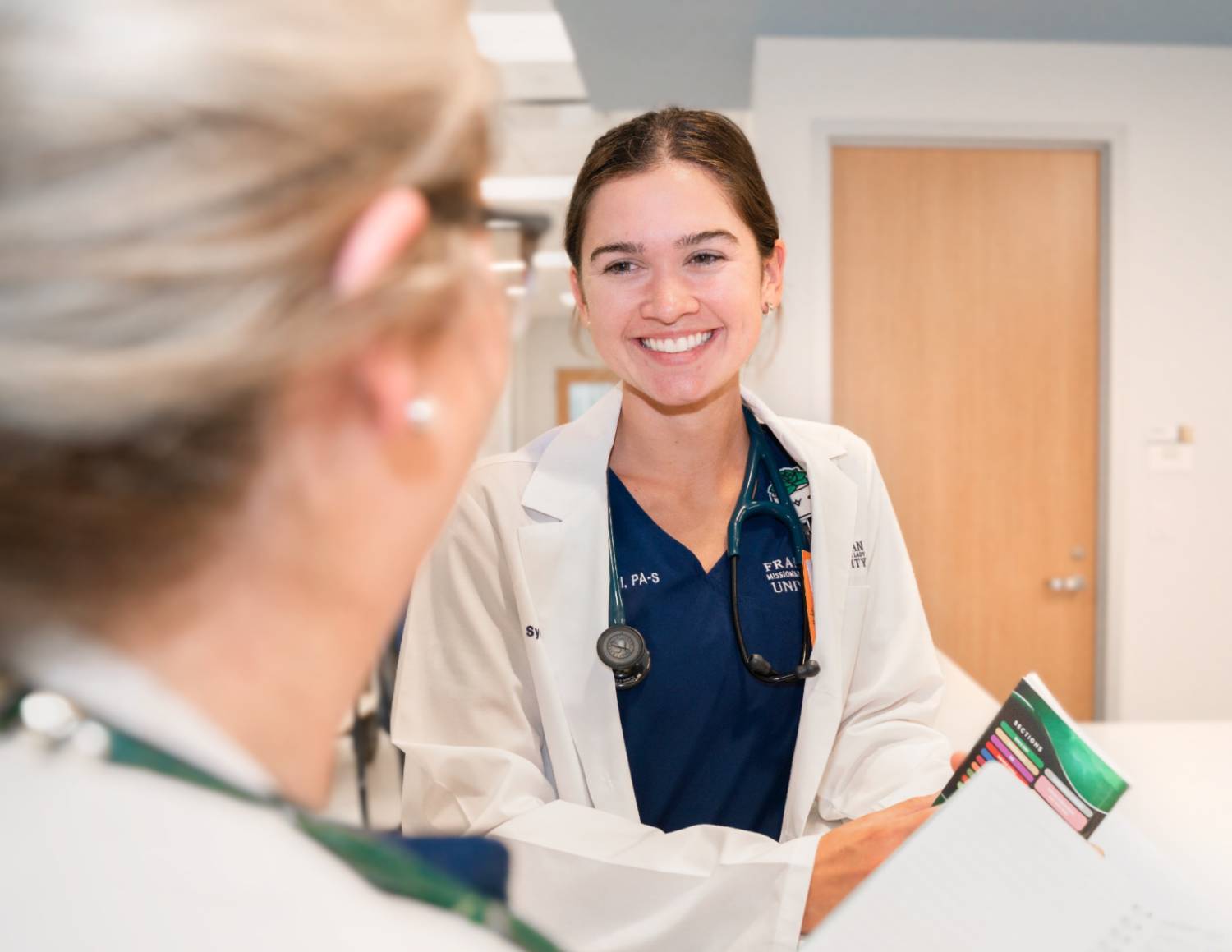
Curriculum Overview – What Will You Learn?
The physician assistant studies master’s degree program offers a fast-paced, rigorous curriculum designed to empower healthcare professionals with the expertise to provide the highest-quality care. But we don’t stop there — we nurture the minds and hearts of our students, helping them practice medicine while upholding values of compassion, empathy and care.
Our courses cover basic medical sciences like anatomy, physiology and pharmacology, as well as clinical medicine topics such as physical examination, diagnostic methods and clinical decision-making. Students develop both the medical knowledge and practical abilities to diagnose and treat patients, as well as crucial soft skills like communication and teamwork.
Where Progress Makes Headlines

FranU Graduate Finds Her True Calling Through Psychology and Service
FranU Alumna Emily Smith's path after graduation




